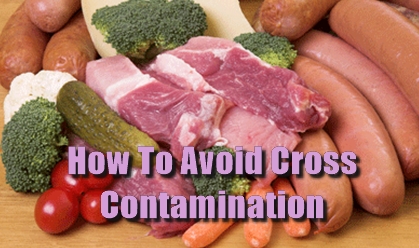You don’t have to look too hard to find stories of caterers being prosecuted for breaches of Food Hygiene regulations or for tales of customers who have fallen ill with food poisoning. It doesn’t matter whether you are just selling the odd sandwich, making up a bit of grub to give to the pool team or serving restaurant quality food from your pub kitchen your primary concern should be maintaining the highest levels of hygiene and safe practices. This first guide in the series deals with Cross Contamination, others will cover Effective Cleaning, Freezing & Chilling, Cooking and Kitchen Management
These guides will take you through the basics of Food Hygiene and show you what to do to produce food that is safe to eat. It is based on the principles of Hazard Analysis Critical Control Point (HACCP). It is for everyone who is involved in the preparation and cooking of food in your pub and includes details of safe methods to adopt in your food business. See separate article on HACCP by clicking here.
Putting this advice into practice will benefit your pub and help you to:
- comply with food hygiene regulations
- show what you do to make food safely
- train staff
- protect your business’s reputation
- improve your business, e.g. by wasting less food
Cross Contamination
Cross contamination occurs when harmful bacteriaare transferred from food to food, work surfaces, equipment and hands and is one of the most common causes of food poisoning. Harmful bacteria are everywhere in Nature but the most common ones affecting humans are found in raw poultry or meat and in eggs. You’ll find bacteria on cloths, kitchen equipment, on pests (such as rodents or insects) and even on you and your staff.
Other sources of contamination that happen in kitchens are from ‘physical’ sources (foreign objects such as bits of packaging) and ‘chemical’ (this might be from cleaning products).
Food allergy sufferers (such as peanuts) and those with food intolerances (such as gluten) are especially vulnerable to cross contamination so you must ensure any ingredient likely to cause a health risk in this way are carefully separated and prepared away from other foods.
Safe Methods to Prevent Cross Contamination
Personal Hygiene
You need to ensure that you and your staff follow good personal hygiene practices to help stop bacteria infecting foodstuffs. This means always washing hands before touching or preparing food; changing into clean clothes (i.e. into chef’s whites) that cover as much skin as possible (long sleeved jackets, full length trousers, hats/hair-nets, aprons); not wearing jewellery or wrist watches and not drinking or eating when preparing or cooking food. Of course with the advent of the ban on smoking in the workplace no one should be smoking in the vicinity of food either.
Your staff should have a separate area to change from and store their outside clothes into their kitchen uniform and it’s also a good thing to have spare sets of kitchen clothes available for visitors and at the very least some disposable aprons for those not normally employed in the kitchen who might be “lending a hand”.
Personal Health
Staff should be fit for work and this means they most not be suffering form or carrying a disease or illness that might pose a food safety problem. Under no circumstances should you or your staff handle food if suffering from diarrhoea or vomiting, If a member of staff becomes unwell whilst at work, they should be sent home at once, not matter how inconvenient to the business, and they shouldn’t come back to work until they are clear of symptoms for a minimum of 48 hours.
Sores and cuts are also prime contamination routes and these should be covered with a coloured, waterproof dressing – hence the ubiquitous blue plaster you see in kitchen and pub first aid kits. Blue was chosen as it’s not a very common natural colour in foodstuffs and as such is easily spotted.
Cleaning Cloths
Dirty cleaning clothes and tea towels are a prime cause of cross contamination in the kitchen and they have to be used safely to prevent bacteria spreading. Ideally disposable single-use cloths should be used, especially with ‘ready to eat’ food as raw food will not benefit from cooking processes that kill bacteria.
Using solely disposable, single-cloths isn’t economically viable for most kitchens so there will be some re-useable clothes and tea towels in most pub kitchens, the important thing is to ensure they are thoroughly and effectively cleaned after each use. This is especially important when cleaning utensils and surfaces where different types of food such as raw and cooked meats is concerned. Store used cloths in a dedicated container (they are less likely to be used again whilst dirty) and at the end of service all re-useable cloths should be put through a hot water cycle in the pub washing machine.
Continue reading … page 2 • page 3
